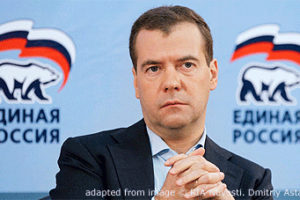Russian Ruling Party Sticks With Medvedev As Chairman, Other Familiar Faces

(Article text ©2021 RFE/RL, Inc., Radio Free Europe/Radio Liberty – rferl.org – Dec. 4, 2021 – article text also appeared at rferl.org/a/united-russia-medvedev-continues/31594002.html)
Dmitry Medvedev, the former president and longtime sidekick to Vladimir Putin, has won a new five-year term as chairman of the ruling United Russia party.
He was chosen unanimously at a party congress on December 4 that also returned other veteran leaders to senior posts.
Medvedev is currently the deputy chairman of the Russian Security Council, a standalone part of the presidential administration with formal and informal influence on security-related policies.
He maintains leadership of the party following elections in September that highlighted declining support for United Russia.
Critics say it took the systematic elimination of challengers like jailed opposition leader Aleksei Navalny, along with fraud and administrative resources to keep the Kremlin-backed United Russia in tight control of government in the face of a falling standard of living for most Russians.
“We will try to help every person regardless of his political convictions,” Medvedev told delegates after his reelection.
Medvedev served as president for one term from 2008-12 in a move that allowed Putin to claim compliance with Russia’s constitutional two-consecutive-term limit upon his return.
Boris Gryzlov was reelected as United Russia’s chairman of the supreme party council, a post he has held since 2002.
Andrei Turchak was also given a new term as secretary of United Russia’s general council.
United Russia’s support was 28.6 percent in late November, according to state polling agency VTsIOM.
The Communist Party was second at around 18 percent.
Putin’s current stint as president has seen the jailings of political opponents, a further consolidation of Kremlin influence over media, a tightening of prohibitions on dissent, and the use of a controversial “foreign agent” law to frustrate and shut down independent NGOs and journalists.
